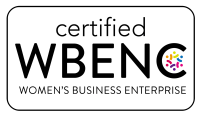You don’t have to be a marketing professional to recognize that AI is changing how we search for information.
Likely you’ve seen—and even relied on—AI Overviews from Google. Or you’ve started turning to ChatGPT, Claude, or Gemini to find what you need.
It’s convenient, right? These platforms act like your personal research assistant, analyzing multiple sources and serving up a comprehensive answer on the spot.
But if you’re the leader of a small or medium-sized business or nonprofit, you’re (hopefully) wondering what this means for you. If you’re no longer clicking on Google search links, or even starting with Google, maybe your prospects aren’t, either.
How to Adapt Your Search Strategy for the AI Era
Will AI completely replace traditional search results? No, but the rules are changing. Search marketing strategies will increasingly need to build long-term trust and authority through content strategy.
Here’s why. Traditional search marketing uses strategies like search engine optimization (SEO) and search engine marketing (SEM) to rank your website higher in search results. Naturally, the higher you are in search results, the more likely you are to be seen.
With AI systems on the rise, prospects might get their answers directly from an AI overview that may or may not mention your company. They may never even view a list of search results. The challenge is obvious: if people are skipping the list of search engine results—or not even using search engines at all—how do you get discovered?
The good news is there’s no need to panic. Here are three ways businesses can stand apart in the AI era.
1. Content Quality: Why It Matters and How to Improve
Writers, rejoice! Content strategy matters more than ever. AI systems require high-quality, authoritative content to generate their responses. That means depth and breadth need to take center stage on your website.
Here are a few simple steps you can start taking now to adjust your content strategy for AI:
- Embrace Long-Form, Helpful Content. Instead of creating separate pages for every keyword variation, focus on comprehensive guides that thoroughly cover topics your customers care about.
- Audit Your Content Through an AI Lens. Review your website content and ask: “If an AI system were trying to answer questions about my industry or business, would it find my content helpful and credible?” It’s not enough to explain what your business does. You also need to position yourself as an industry expert.
- Optimize for Q&As. Don’t abandon SEO! It still matters. But people search using conversational queries, and AI systems are responding to this. So how can you integrate new AI search strategies into your content? One way to optimize for new AI search strategies is by integrating questions and answers that are responsive to information your prospects want. You heard us: FAQs are back in vogue.
2. Building Authority: The New Competitive Advantage
Google’s AI Overviews and other AI systems prioritize content from sources they consider authoritative. The businesses that have established themselves as trusted authorities in their field are more likely to be referenced, cited, or recommended by AI systems.
Here are a few simple steps you can take to increase your authority:
- Expand Your Thought Leadership Library. Thought leadership content, case studies, and detailed explanations of your services aren’t just nice-to-have marketing materials – they’re essential for maintaining visibility in an AI-driven search landscape.
- Build Topic Authority. Create original research, surveys, or case studies within your industry. Share proprietary insights that only your organization can provide.
3. Local Optimization: Staying Relevant in Your Market
While AI can provide general information about any topic, it still relies on human businesses to deliver specific services in specific locations. This requires directing time and attention to activities beyond just your website.
Here are a few simple steps you can take to optimize local SEO:
- Maintain Your Local Presence. Ensure your business information is accurate across directories and create location-specific content.
- Build Recognition: Encourage satisfied customers to leave reviews and get mentioned and linked to by other authoritative sites.
So How Can Small Businesses Compete with Larger Companies in AI Search?
In many ways, the transition to AI-powered search could level the playing field for small companies. Genuine expertise and helpful content can compete with big marketing budgets more effectively than ever before. The key is to translate that expertise into content that is meaningful and relevant for your audience.
Navigating these changes requires staying informed about evolving best practices and having a strategic approach to content creation and search optimization. For organizations without dedicated marketing teams, partnering with experts who understand both the technical aspects of SEO/SEM and the broader implications of AI can make the difference between thriving and merely surviving in this new landscape.
Don’t Get Left Behind in the AI Search Revolution
Think you might need to rethink your digital marketing or marketing search strategies? We can help.
At The Marketing Collective, we help growing B2B businesses and nonprofits build and execute marketing plans that connect business goals with clear, creative strategies. Whether you want to evaluate your content marketing approach to align with AI-powered search or explore new digital marketing possibilities, we can help. Give us a shout to discuss how we can take your marketing to the next level.

About Rebecca Correa
Digital Marketing Strategist
About Rebecca Correa
Digital Marketing Strategist
Rebecca Correa is a Digital Marketing Strategist at The Marketing Collective, bringing more than 20 years of experience in marketing—with the past 15 focused on digital strategy. She has developed and led data-driven campaigns for clients in industries including consumer electronics, professional services, and nonprofits. With a mini-MBA in Digital Marketing and a strong foundation in market planning, email marketing, and social media analytics, Rebecca builds integrated strategies that drive engagement, leads, and brand growth. She is also known for mentoring high-performing teams and aligning marketing efforts with measurable business results.

